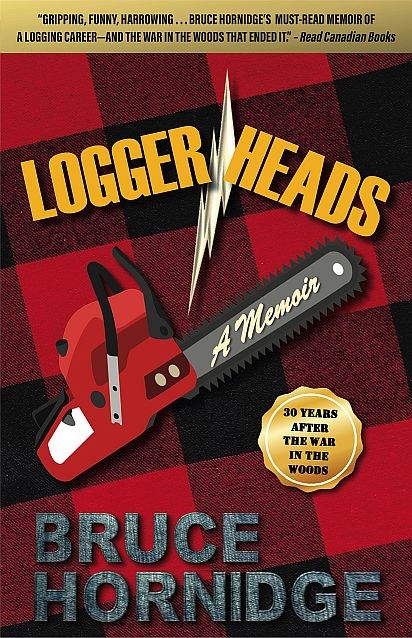“Loggerheads"
by Bruce Hornidge
Published by Endless Sky Books
$24.99 ISBN 9781989398975
In 1993, I was travelling toward Tofino with my young family while an anti-logging protest was brewing in the surrounding forest, and Bruce Hornsby’s “If a Tree Falls” was the soundtrack. Thirty years later, how ironic to read a detailed memoir by a former B.C. logger and get a different perspective on that tumultuous “War in the Woods.”
Loggerheads is a candid account of the “Clayoquot Sound land-use scuffle” between logging protestors and forestry giant MacMillan Bloedel, and the “world media hype” that accompanied it. It’s a peppery book, written by a man who had (caulk) boots on the ground: Ex-Clayoquot Sound forest worker Bruce Hornidge, who at times was “dripping saliva from [his] teeth” while protestors were “[chaining] themselves to logging equipment and [obstructing] forest workers from doing their jobs.”
In his metaphor-rich account, he says the decade-long forest and land-use tensions “raged like a forest fire” and “a tsunami of Utopian beliefs and related misconstruing washed over the West Coast of Vancouver Island from around the world.”
Hornidge began working for the Kennedy Lake Logging Division of MacMillan Bloedel Ltd., near Ucluelet, in 1967. He pulls zero punches regarding how he felt about the demonstrators and tree blockades, the “octopus-like bureaucracy,” the media (“There was little interest in the logger’s point of view from their predominantly urban audiences”) and “the affected people, the families losing livelihoods,” including his own family. He writes as well about “fear-style management,” unions (“a good thing”), fires, and friends and foes made during his logging industry life.
Politics aside, the author also includes much practical information about what it takes to be a tree feller, with descriptions of bucking, falling (“a noble enough calling”) and the many ways a tree can end a logger’s life. One must “determine where the tree will go — and put it there.” Easier said than done. His conversational anecdotes frequently include drama (a chunk of windfall “took my hardhat off my head as I hit the good old Mother Earth” and “I saw the bar and chain beside my right eye and ear. My glasses disappeared off my face.”)
He discusses the brush aka “crap” (salal bush, ferns, etc.) that makes logging challenging, and something called “vibration disease” (Reynaud’s Phenomenon), caused by power-saw vibrations; they could eventually result in finger or hand amputations. Hornridge also shares the harsh psychological effects of being considered “a heartless chainsaw-wielding mass murderer of trees.”
In 1993 the band Midnight Oil visited the region “to bolster the Clayoquot Protest event.” Greenpeace and a “German film group” also amped things up: “It seemed the media was dancing for the protest groups, and the protest groups were acting for the media.”
Regardless of one’s opinion of logging, it’s undeniable that Loggerheads is insightful, well-documented and at times poetic, and as its passionate author — now retired and living in Ontario — fittingly says, his “personal clarification of events” has been “Written, ironically, not on tables of stone like commandments, but on paper. From wood.”
This book is available at your local bookstore or from www.skbooks.com




